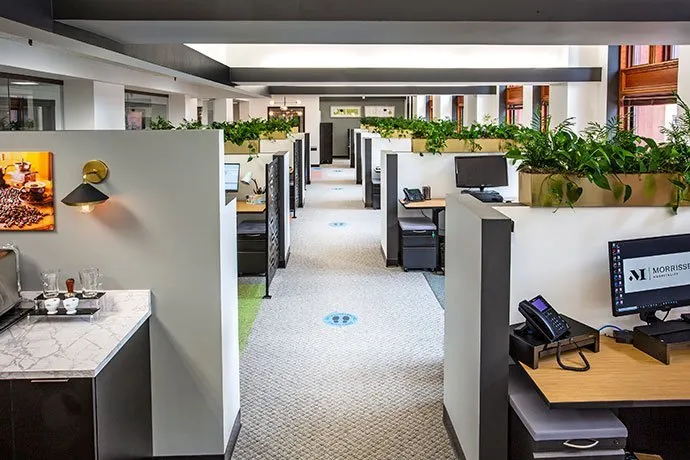Welcome to the topic “Traditional Office Space Vs. Co-Working Space”
There are many choices people have these days when it comes to renting commercial spaces. Naturally, most business owners want an office space that’s not only cost-effective but also convenient for their clients and employees. These spaces should also fulfill all organizational requirements in terms of health, safety, as well as include beneficial amenities to aid in attracting and retaining top talent.
Among the many choices of commercial real estate spaces for companies to consider, the two that present themselves the most are 1. Traditional Office Space and 2. Co-Working Space.
Both options have their own set of unique benefits and drawbacks. So deciding which one is best for your company really boils down to factors such as size of your business, lease terms, budget, and so on. The following questions are also good points of reference to help influence your decision:
1. What is the company’s goal for using the space?
2. What needs is the space addressing for the company’s benefit?
3. What is the budget the company has set for obtaining a space?
4. What space would provide the greatest Return on Investment (ROI)?
Of course, the answer to each of these questions will vary widely based on the specific needs, goals, and desires of the organization. So to help guide executives and leaders in their decision regarding which space to choose, we have listed out several universal pros and cons of each commercial space option.
This list is not exhaustive, but it does provide a simple and quick framework for deciding which direction not go when initially looking for commercial space.
Traditional Office Space Vs. Co-Working Space: The Benefits
These days, many businesses are looking for ways to be more flexible, adaptable, and innovative; which is exactly why the concept of co-working space was first introduced. However, businesses are also looking for ways to stay top of mind with their target audience and make a lasting impression with their brand; which is why traditional office space is still largely utilized.
It’s common for business owners to struggle with decisions regarding which values are most important to the health and longevity of their business. The good news is that this is not an ‘either or’ decision. Business owners can get the best of both worlds depending which commercial space they choose and how they use it. They just need to know what each space has to offer and compare the pros and cons to what the business needs most.
Traditional Office Pros
Let’s start our discussion by shedding some light on the positives of leasing traditional office space and how it can benefit your business in the long-term.

Company Branding
When you lease a traditional office space, you usually get complete creative freedom to design it exactly how you want it. You have complete control over how your company’s brand is externally displayed and internally seen.
From the moment someone walks into your company office they are enveloped in your company’s branding. The company logo placement, color scheme, furniture design, art curation, client amenities, and more will not only create a first impression that matters, but it will also have a long lasting effect on the people who experience your branding and reach far beyond your office space.
With traditional office space, you always have the power to ensure that your customers, clients, and even investors get an insight into your company’s values, goals, and culture – which is all deeply embedded into a company’s brand. Right from the moment someone walks through the doors, they are already getting a strong sense of who your company is and what it stands for; which will only strengthen client/ customer relations and help attract and retain top talent.
Privacy
Privacy is one of the most coveted commodities in business right now. From team meetings, to client meetings, to long term planning meetings, and even in terms of office initiatives – privacy is extremely valuable. Granted, public knowledge and transparency are vital to the success of any company, but equally important is the ability to have confidential and candid conversations to discuss sensitive information for the betterment of the company as a whole.
That’s why privacy is one of the most significant traditional office pros that you should consider.
Even when considering something as simple as leaving food in the kitchen area, or setting up storage areas, or personalizing workstations – having the privacy and ownership of a full office space is needed to accomplish even the smallest things with a sense of security and peace of mind.
With the privacy of a traditional office space, your employees do not need to be concerned about sharing common areas with people from other companies that may not share the same company values, goals, and culture as yours. They will also avoid having their work unknowingly seen or their conversations unintentionally heard.
Cost-Effective
On a monthly basis, it might appear that traditional office space is more expensive overall. However, on a per square foot basis, traditional office space leasing will cost you about half to two-thirds less co-working. Therefore, in terms of your budget for a commercial space, often times it makes more financial sense to go with a traditional office space. Particularly, when considering the amount of in-person days for your labor force.
Customization
When you lease a traditional office space, the entire space is yours to design as your company sees fit. Meaning you can add employee amenities and spaces that not only entice people to come to the office, but make them enjoy staying in the office too.
Customizing the layout of your office space is one of the easiest ways to foster a strong company culture of collaboration, creativity, innovation, and productivity – which will provide the biggest return on investment for your commercial space.
Co-Working Space Pros
Leasing a co-working space has its own perks as well, which is why this may be a better solution for some businesses that choose this option.
Flexibility
This is what most business owners love about co-working spaces. When you opt for a co-working space, you get the flexibility in your lease agreement and terms; you don’t have to abide by a long-term leases and the terms are usually either month-to-month or less than a year.
Additionally, you get the financial flexibility of amenities like utilities, internet, and phone lines being covered in your fee – helping to save on monthly overhead.
You also have the flexibility of space utilization. Depending on your company size, you can use as much or as little space as you need to accomplish company goals. You can grow or shrink your physical space requirements with ease – avoiding the hassle of construction to build bigger or having to relocate to downsize.
Plenty Of Collaborating Opportunities
The life force of many businesses is the health and size of their network. That network includes clients/ customers, employees, supporters, and other professionals in your market that offer complimentary or beneficial services to you and your target clientele. Consistent access to low-barrier networking is one of the biggest benefits of co-working spaces in the 21st century. By sharing common spaces and even work spaces with other businesses, you are accessible to more strategic conversations, skillsets, resources, and relationships.

Traditional Office Space And Co-Working Space: Potential Drawbacks
Of course, we cannot claim that either traditional office space or co-working space is without drawbacks. There are some factors you will need to consider before signing a lease for either option.
Co-Working Cons
Here are some potential challenges that you should be prepared for when you lease a co-working space.
Sharing Of Common Areas
When you lease a co-working space, you have to remember that you will be sharing common areas with people outside of your organization. Therefore, there will likely be times when you unintentionally step on someone’s toes, whether it’s related to the use of common space, equipment, or amenities.
For example, a common issue tends to be the reservation of large common areas – like conference rooms.
Say someone reserves the conference room for 3 hours for a meeting of 6 people, but only 2 people show up. Well, those 2 people are still entitled to that 3-hour reservation of the entire conference room – regardless of whoever else might need it.
Other points of conflict arise when sharing other spaces like kitchens or sharing equipment like copiers and printers. Depending on the temperaments and values of the people involved, the atmosphere can get intense pretty fast.
Usually co-working space impose strict rules over usage of these common spaces and amenities to avoid such conflicts. However, with constant rules in place it can make working environments more difficult and also hinder productivity.
No Customization
These days, the importance of branding cannot be emphasized enough. For better or worse, customers, investors, and by-standers judge businesses based on their branding efforts or lack thereof. First impressions are not only important, but they have a lasting affect on people.
Utilizing office space that does not reflect your company’s brand, values, culture, or goals is a risk in today’s market. Therefore, not having a traditional and highly branded space puts more pressure on your employees to demonstrate your company values through their communications and interactions with clients and the public at large.
Furthermore, with co-working space businesses are extremely limited with the layouts and amenities that are offered to their employees. If the co-working space does not have a kitchen, or if it doesn’t have a conference room, the business has no options in proving one to its staff. Therefore, being able to find a co-working space that meets are the needs of a businesses workforce can be more of a challenge than anything else.

Lack of Company Culture
When you share an office space with another business, it’s also hard to enforce your own company culture throughout the entirety of the space. How do you get your employees to adhere to certain rules when the people in the next room aren’t following the same protocols? It’s challenging to hold your workforce to a certain standard when they environment at large is not conducive to upholding that standard. Furthermore, being able to establish unity or instill loyalty in your team becomes almost impossible without having a dedicated environment that allows your employees to feel valued and appreciated within the company.
Traditional Office Space Cons
The most significant problem of leasing a traditional office space is the extensive upfront costs associated with building out and branding a new space.
Not every business has the necessary budget to acquire commercial space in their desired area and build it out exactly to their desired specifications.
Furthermore, the negotiation process for a traditional office space tends to be much more intense than with a co-working space. Negotiations with traditional office space leases are crucial to the financial longevity of a business. That’s why it’s so important to work with a cre brokerage firm that knows what they are doing and will fight for your company’s best interest.
Traditional Office Space Vs. Co-Working Space: The Final Verdict
At the end of the day, it all comes down to what your office requirements and business needs are for the short and long term. It’s important to keep in mind that your business, workforce, and financial needs will likely change over time. So remember, whatever decision you make now is not set in stone forever. As your needs change and grow, so will your commercial space. That’s the best part of having commercial property; it serves as a direct reflection of your business culture, values, and goals.
Also read: The ROI Of Leasing Traditional Office Space
TAGS